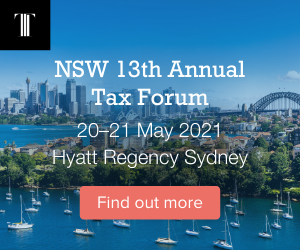-png.png)
You won’t catch Mariana von Lucken, CTA Partner at HLB Mann Judd, preparing for her speaker sessions just anywhere. Instead, you’ll find her out on the water at any opportunity.
“It always makes life more interesting when you are writing a presentation while sitting on a boat instead of being stuck inside,” she told us.
Mariana has been a member with The Tax Institute since 2002, and in that time has served on professional development and other committees, embracing the opportunity to organise professional events, chair, present and give her opinion. And she’ll once again be out on the boat with presentation slides on her mind, as she prepares for the NSW 13th Annual Tax Forum this May.
Mariana will be presenting an expert session centred around R&D, aptly titled, R&D is back and alive. Australia’s taxation approach to R&D has always been beset by challenges and uncertainty. In fact, it was one of the big topics covered at The Tax Summit: Project Reform and will feature in The Tax Institute’s upcoming The Case for Change paper (watch this space!).

Difficulties in raising capital and limited support for those businesses who do embark on R&D often means that valuable Australian IP is lost to offshore buyers. The R&D tax incentive was introduced to encourage R&D activities, but it, along with the entire R&D tax regime, still needs to be reviewed and refined.
The outcome of the 2020-21 Federal Budget, in which the Government announced that it would make additional enhancements to the proposed changes to the R&D tax incentive, was a win for Australian businesses and innovators.
These changes were put into effect by Treasury Laws Amendment (A Tax Plan for the COVID 19 Economic Recovery) Act 2020 and were aimed at encouraging Australian businesses to invest in R&D in the wake of the COVID-19 pandemic, and its financial impact.
Some of the most significant changes include:
- bring forward into the 2020-21 financial year increases to certain income tax thresholds and the increase in the amount of the low-income tax offset to $700
- to retain the low and middle-income tax offset for the 2020-21 financial year
- enable corporate tax entities with an aggregated turnover of less than $5 billion to carry back a tax loss for the 2019-20, 2020-21 or 2021-22 financial years and apply it against tax paid in a previous financial year back to the 2018-19 financial year
- enable eligible entities with an aggregated turnover of $10 million or more and less than $50 million to access certain small business entity tax concessions
- permanently increase the R&D expenditure threshold from $100 million to $150 million
- link the R&D tax offset for refundable R&D tax offset claimants to claimants' corporate tax rates plus an 18.5 percentage point premium
- enable businesses with an aggregated turnover of less than $5 billion to deduct the full cost of eligible depreciating assets that are first held, and first used or installed ready for use for a taxable purpose, between the 2020 budget time and 30 June 2022
- extend the time by which assets that qualify for the enhanced instant asset write-off must be first used or installed ready for use for a taxable purpose until 30 June 2021.
These amendments have a proposed start date of 1 July 2021 and Mariana said that attendees will walk away from her session knowing they’ve been updated on the latest in the space.
“I would like participants to understand the benefit of the R&D tax incentive, what changes apply from 1 July 2021 and how this will affect their clients, if at all,” she said.
“They will know what changes are coming, the latest cases from Innovation side and Tax Office side, so that they are better able to inform their clients.”
Mariana is now stranger to innovation in her own line of work, telling us that “varied and challenging questions raised by clients in all walks of life” are what make her job so enjoyable.
“What I find fascinating is no matter the size of the client the work can take just as long, and on average no tax question is straightforward. Have the variety of clients with a variety of tax issues ensures that you keep up to date in all areas of tax,” she said.
Mariana is looking forward to keeping up with what colleagues across the tax space are doing by attending other sessions at the NSW 13th Annual Tax Forum, including Session 11A: Using rollovers to restructure, presented by Richard Son, PwC and Kaajri Vaughan, PwC, which Mariana said is “a useful topic to ensure you can restructure your business when the time comes.”
She’ll also be coming along to Mark Richmond SC, CTA, Eleven Wentworth’s Session 4A: The broader issues of trust distributions - it is not all about tax to get some answers – “I ask myself if it is not all about tax what is it about?” she quips.
Join us at the NSW 13th Annual Tax Forum
When: 20 May 2021 - 21 May 2021
Where: Catch Mariana and the rest of our expert speakers online from the comfort of your home (or boat!) or, in-person at the Hyatt Regency Sydney, a waterside retreat in Sydney located adjacent to Darling Harbour in Sydney's Central Business District.

About Mariana von Lucken
 Mariana von Lucken, CTA is a Tax Partner with HLB Mann Judd, and has advised a wide range of clients on a wide range of income tax, GST, FBT, international issues, payroll and R&D issues. It is important to her to give back to the profession – she is involved in The Tax Institute’s Professional Development and Women in Tax committees
Mariana von Lucken, CTA is a Tax Partner with HLB Mann Judd, and has advised a wide range of clients on a wide range of income tax, GST, FBT, international issues, payroll and R&D issues. It is important to her to give back to the profession – she is involved in The Tax Institute’s Professional Development and Women in Tax committees








